by Bay Oral Surgery | Mar 2, 2020 | Blog
In honor of National Dental Assistant Recognition Week, which is March 1st-7th, 2020, we want to recognize our fabulous staff of Surgical Assistants at Bay Oral Surgery & Implant Center! We have a staff of 16 Surgical Assistants across all four of our Bay Oral offices: Green Bay West, Green Bay East, Marinette & Niagara. Some of our assistants split their time between multiple offices. They are a great staff and we are very proud of them. As Dr. LeMoine stated: “Our Surgical Assistants work hard every day to provide the best possible experience for our patients and for us (the doctors). We couldn’t work without them!”
Meet the Bay Oral Surgical Assistants and learn more about them below.
Kayla Boettcher
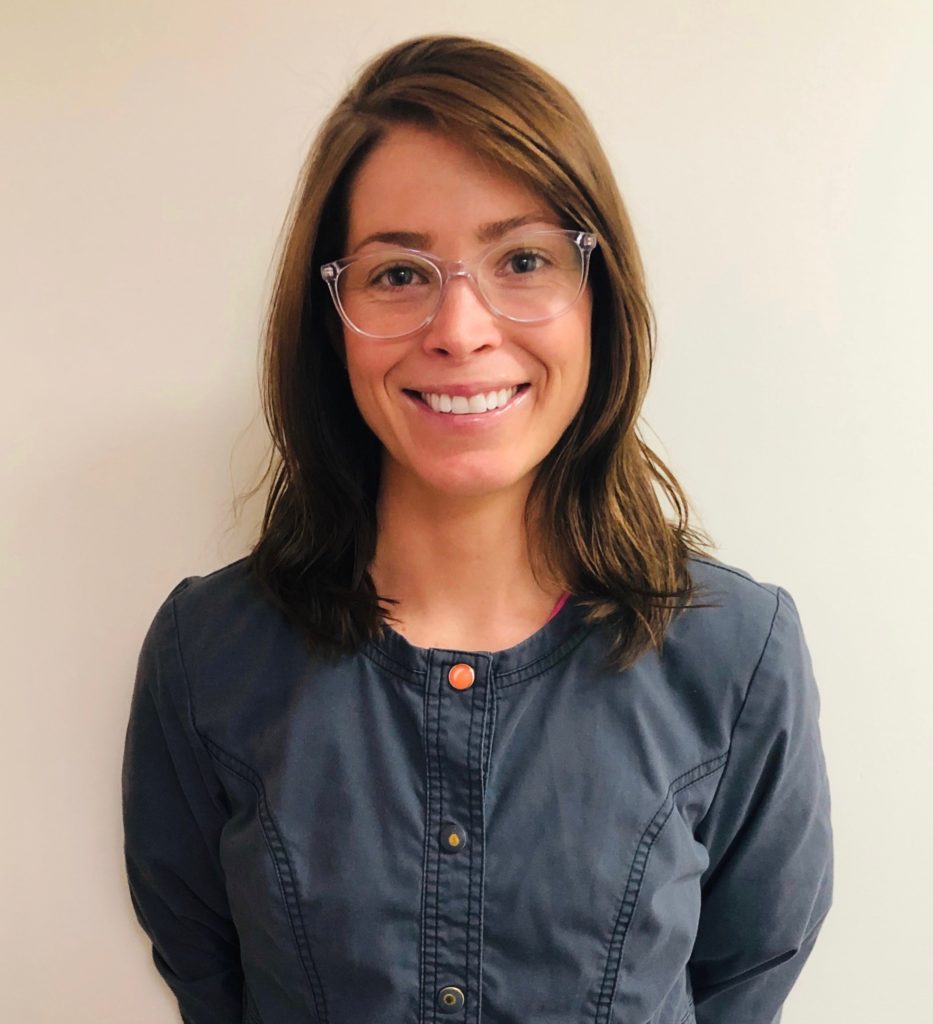
Which locations do you serve?
I work primarily in the Marinette & Niagara offices.
How long have you been with Bay Oral?
I’ve been with Bay Oral for 3 years and in the dental field for 10 years.
What is your favorite thing about being a surgical assistant?
I enjoy working for a well-respected company.
What is a fun fact about yourself that people may not know?
I’m running my first half-marathon in May.
Megan Dax

Which locations do you serve?
I work primarily at both Green Bay offices.
How long have you been with Bay Oral?
I started at Bay Oral on November 1st 2010, right after graduating as a surgical tech, so 9.5 years.
What is your favorite thing about being a surgical assistant?
I love being able to work directly with each patient, one-on-one, while still actively participating in the surgeries. The variety of surgeries that we do keeps our day interesting, fun, and keeps us focused.
What is a fun fact about yourself that people may not know and/or your favorite hobbies?
My boyfriend and I raise chickens, hunt, fish, and garden. We process all of our own wild game, which we eat year-round, making our own steaks, jerky, bacons, summer sausages, etc. We also process and freeze our garden vegetables so we have them year-round as well and have fresh farm eggs everyday. This keeps our grocery bills and visits very minimal and infrequent!
Valerie Delebreau
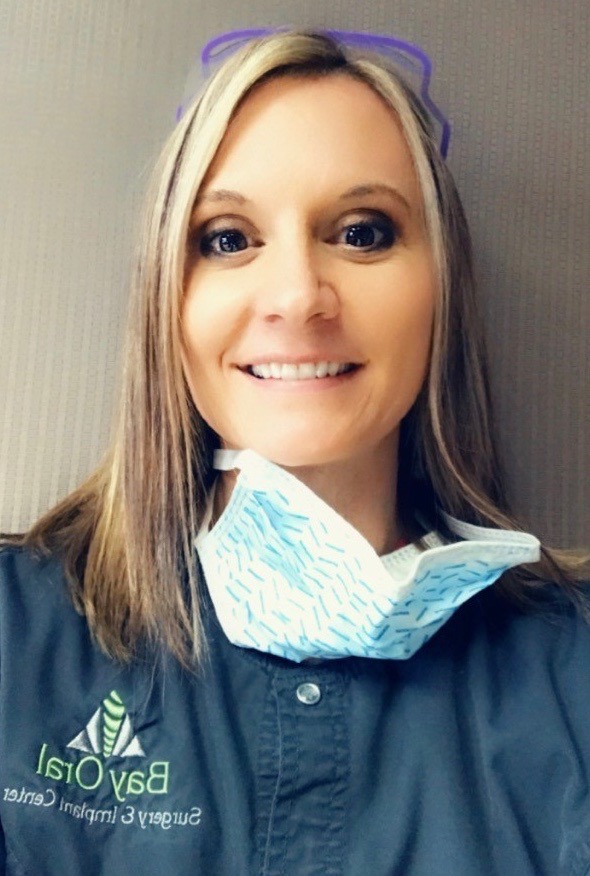
Which locations do you serve?
I work in the Green Bay offices.
How long have you been with Bay Oral?
I’ve been working at Bay Oral for almost 21 years.
What is your favorite thing about being a surgical assistant?
I love the people I work with at Bay Oral and everyday presents something new that makes coming to work a great experience.
What is a fun fact about yourself that people may not know and/or your favorite hobbies?
We have 3 kids and I enjoy watching them participate in all of their sporting events.
Amanda Dorner
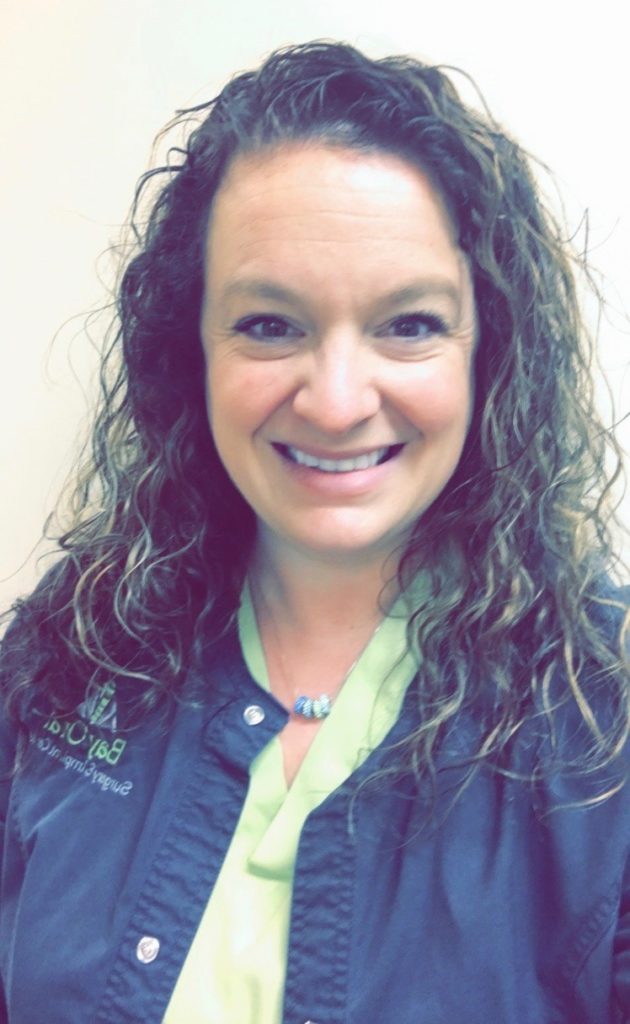
Which locations do you serve?
I work at all of the clinics: Green Bay East, Green Bay West, Marinette and Niagara.
How long have you been with Bay Oral?
I’ve worked at Bay Oral for 17 years, since January 27, 2003.
What is your favorite thing about being a surgical assistant?
I enjoy the fast pace of the clinic and that every patient and surgery is unique.
What is a fun fact about yourself that people may not know?
I’ve been with my husband since I was 16 years old, so we’ve been together for 21 years. Also, I was involved in a golfing accident at the age of 12 and knocked out my 2 front teeth and that’s what inspired me to go into the dental field.
Susan Dzurick

Which locations do you serve?
I work at the Marinette location.
How long have you been with Bay Oral?
I’ve been working at Bay Oral for 17.5 years and in the dental industry for 30 years.
What is your favorite thing about being a surgical assistant?
My favorite thing is the variety of patients I get to work with and see.
What is your favorite hobby?
I enjoy spending time with my 3 horses.
Missy Francois
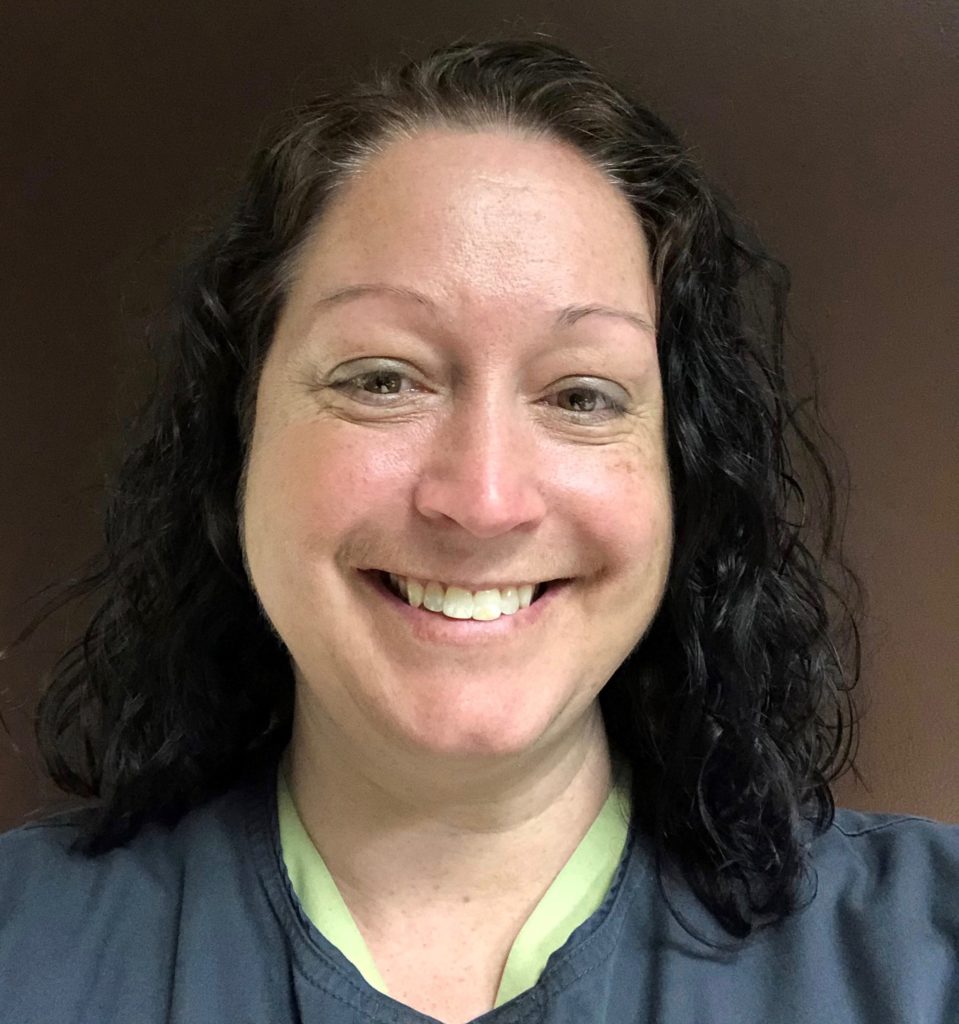
Which locations do you serve?
I work at the Green Bay West location.
How long have you been with Bay Oral?
I’ve been with Bay Oral since May of 1997, so almost 23 years.
What is your favorite thing about being a surgical assistant?
I like the patient interaction–every patient is a new experience and I love the variety of procedures we perform.
What is a fun fact about yourself that people may not know and/or your favorite hobbies?
I love wrestling! My sons wrestle, so my hobby/past-time is watching my guys wrestle.
Nikki Goral

Which locations do you serve?
I work at all four Bay Oral locations.
How long have you been with Bay Oral?
I’ve been with Bay Oral for 14 years.
What is your favorite thing about being a surgical assistant?
I enjoy the people I work with and getting to know patients.
What is a fun fact about yourself that people may not know?
I’m obsessed with food!
Lindsay Hazaert
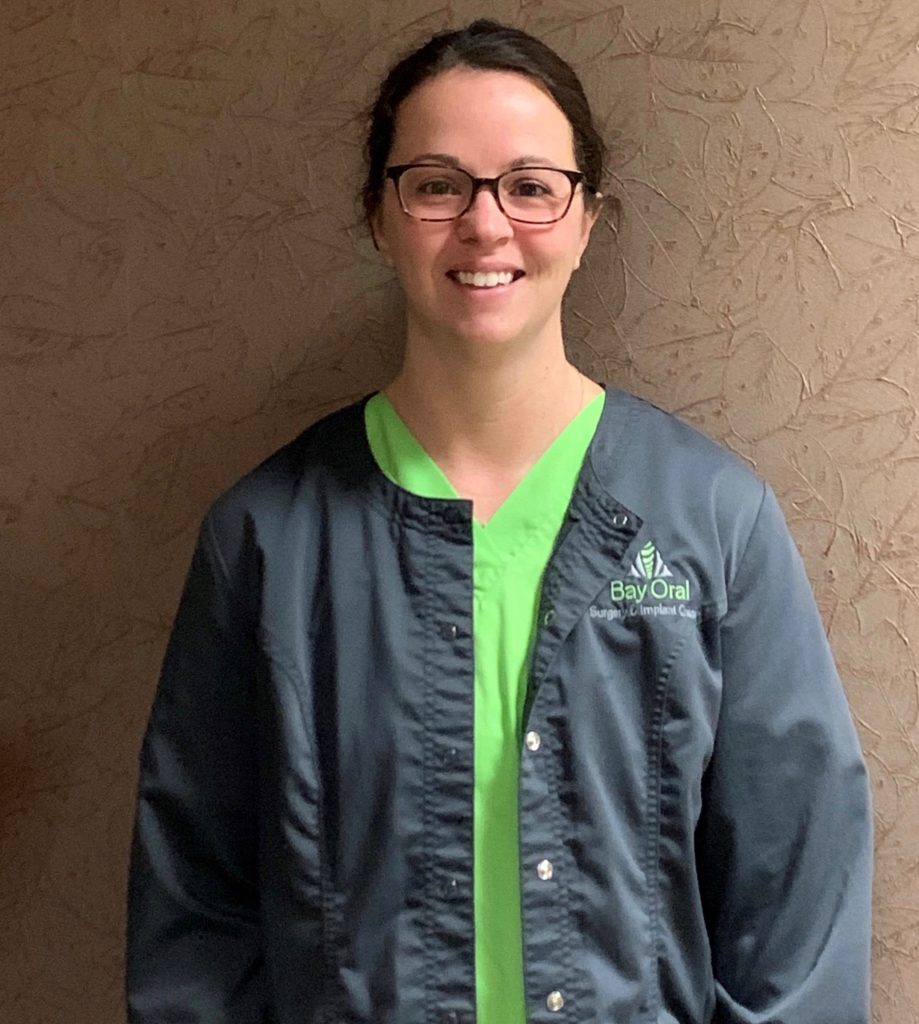
Which locations do you serve?
I work at all four locations, but primarily the Green Bay clinics.
How long have you been with Bay Oral?
I’ve been with Bay Oral for 3 years & have worked in the dental industry for 10 years.
What is your favorite thing about being a surgical assistant?
My favorite thing is interacting with the patients.
What is a fun fact about yourself that people may not know and/or your favorite hobbies?
I’m from Nebraska and I love to travel.
Nicole Herrala
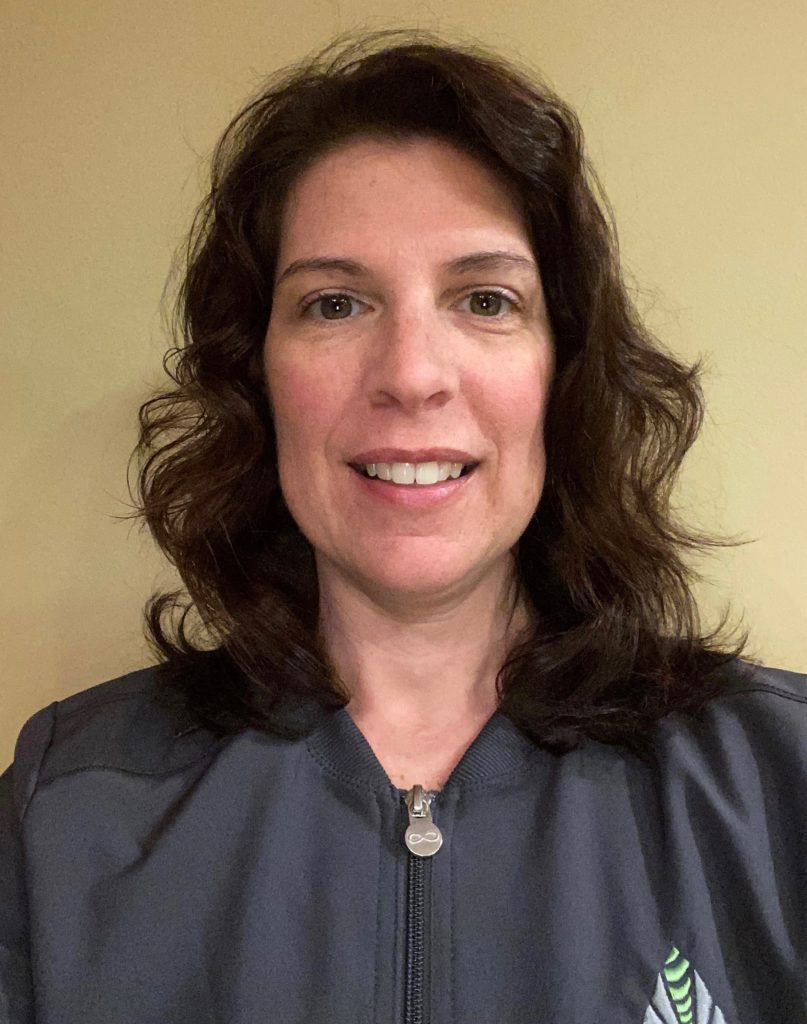
Which locations do you serve?
I work at all four clinics, but mostly the Green Bay West location.
How long have you been with Bay Oral?
I’ve been with Bay Oral for 18 years.
What is your favorite thing about being a surgical assistant?
Patient care is one of my favorite things about being a surgical assistant.
What are your favorite hobbies?
When I’m not cheering on my daughter in basketball and softball tournaments, I enjoy snowshoeing, biking and beach vacations.
Kaitlin LaChapelle

Which locations do you serve?
I work at all Bay Oral locations.
How long have you been with Bay Oral?
I’ve been with Bay Oral for 5 years, since January 2015.
What is your favorite thing about being a surgical assistant?
My favorite thing about being a surgical assistant is working directly with the doctors and the hands-on patient care.
What is a fun fact about yourself that people may not know?
I am an identical twin.
Brenda Lane
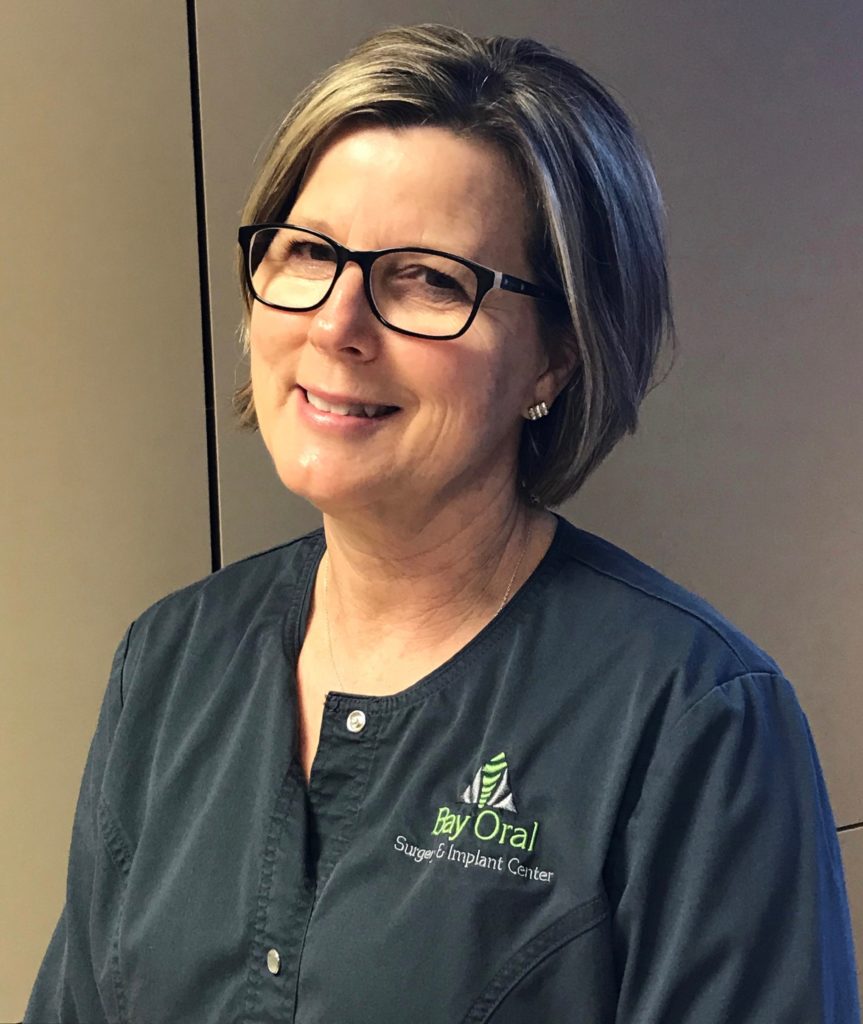
Which locations do you serve?
I work at both Green Bay locations and fill-in at the Marinette location as needed.
How long have you been with Bay Oral?
I’ve been in the oral surgery industry for 13.5 years.
What is your favorite thing about being a surgical assistant?
I like meeting new people and making patients feel at ease; I also really like the doctors and co-workers at Bay Oral.
What are your favorite hobbies?
In my free time I enjoy reading, snowshoeing and kayaking.
Bridgette Luby
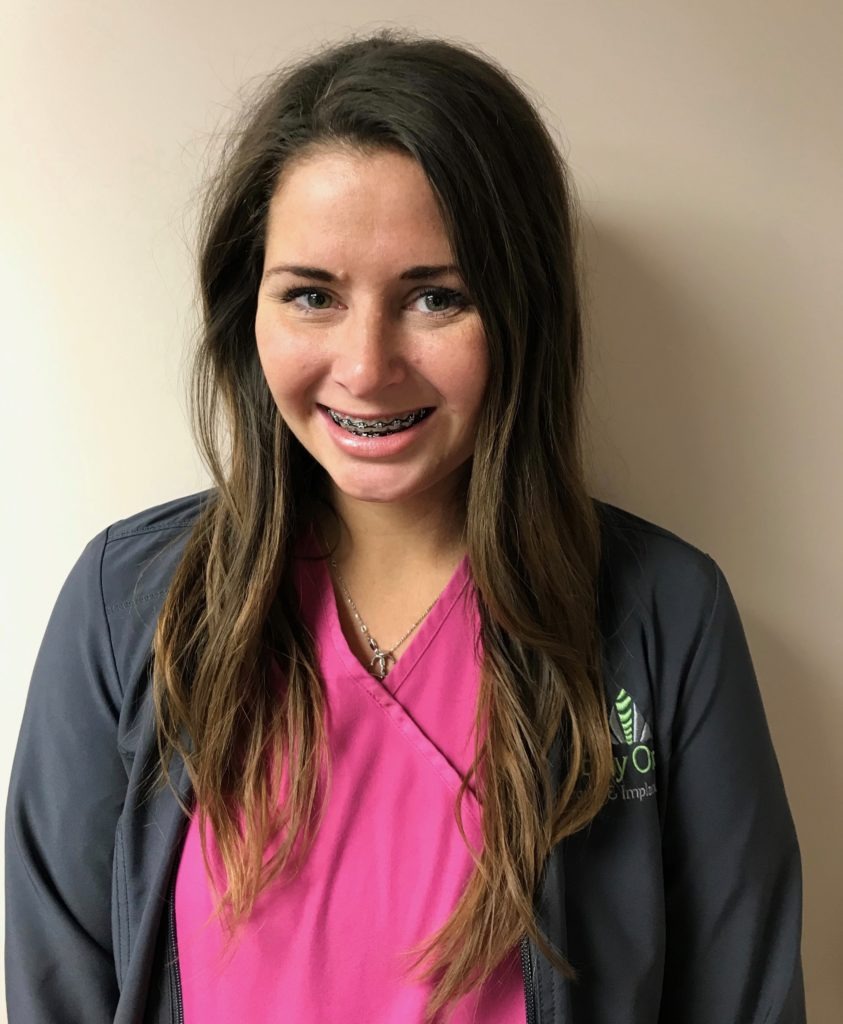
Which locations do you serve?
I work at all four Bay Oral locations.
How long have you been with Bay Oral?
I started at Bay Oral on April 25th, 2016, so almost 4 years.
What is your favorite thing about being a surgical assistant?
I truly enjoy caring for our patients. I enjoy reassuring and comforting them through all stages of their oral surgery.
What are your favorite hobbies?
In my free time I like to go up north with my family.
Amber Plamann
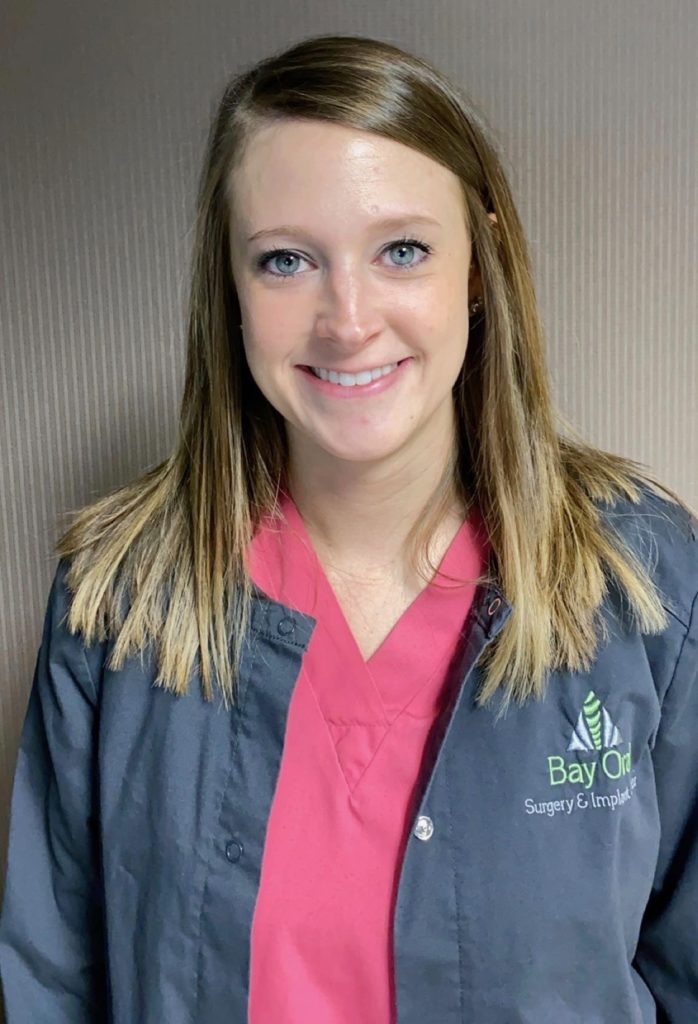
Which locations do you serve?
I work at the Green Bay East and West locations.
How long have you been with Bay Oral?
I started in June 2009, so I’ve been with Bay Oral for 10.5 years.
What is your favorite thing about being a surgical assistant?
I love the fast-paced environment.
What is a fun fact about yourself that people may not know?
I have the biggest irrational fear of frogs!
Carrie Raygo
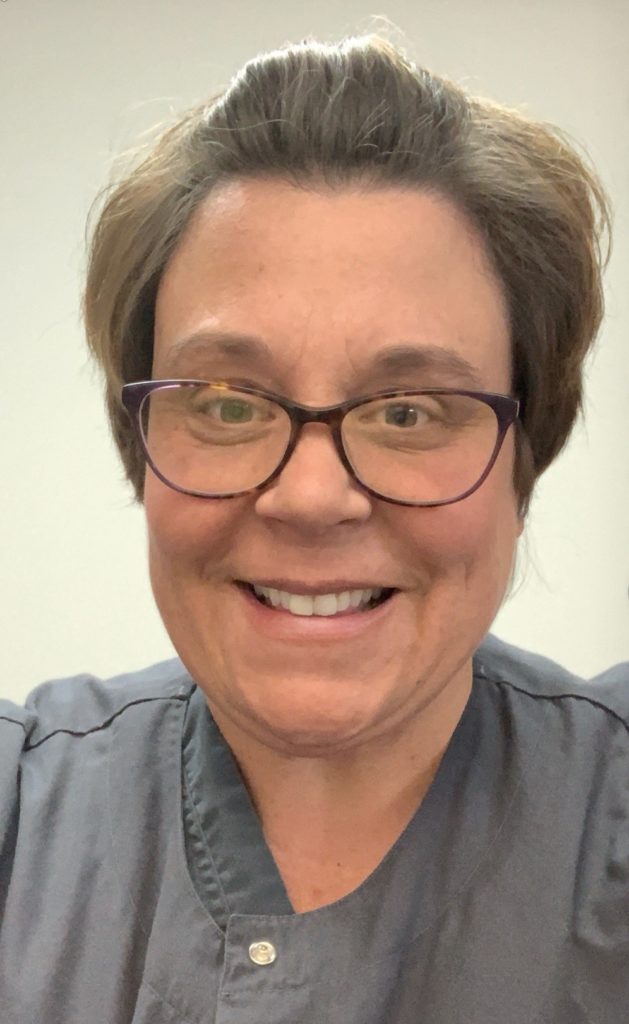
Which locations do you serve?
I primarily work at our Marinette location.
How long have you been with Bay Oral?
I’ve been with Bay Oral for 24 years as a surgical assistant.
What is your favorite thing about being a surgical assistant?
The most rewarding thing about being a surgical assistant is having the opportunity to work with your patient through the process of oral surgery and make it a positive experience for them at our clinic. It always makes me feel good that I helped make that difference for them.
What are your favorite hobbies?
When I’m not working, I enjoy crafting, photography and spending time with my family.
Molly Strobel

Which locations do you serve?
I work mostly at the Green Bay West and East locations.
How long have you been with Bay Oral?
I started with Bay Oral in 2007, so I’ve been here for 13 years and this has been my only dental assisting job.
What is your favorite thing about being a surgical assistant?
I enjoy the patients I get to meet everyday and the people I get to work with–they make coming to work enjoyable.
What is a fun fact about yourself that people may not know and/or your favorite hobbies?
I enjoy this time of year as it is Maple Syrup Season. I’ve been tapping maple trees and making maple syrup for 3 years.
Sophia Styczynski
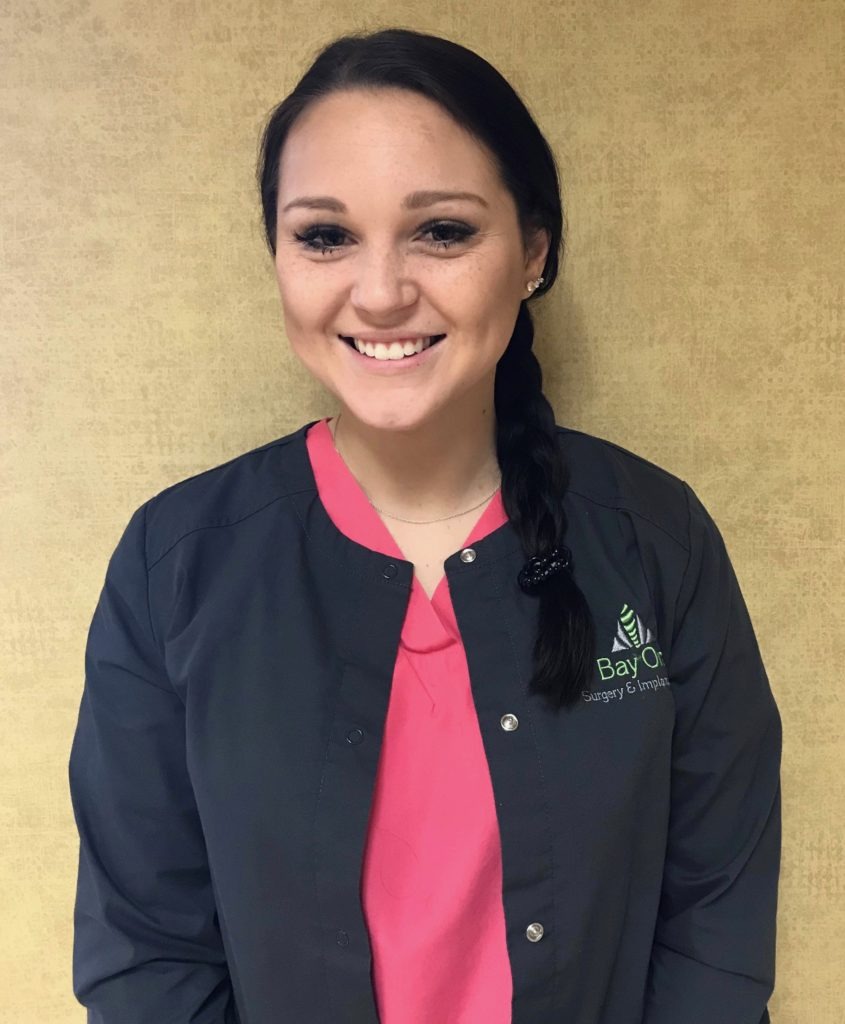
Which locations do you serve?
I work at the Green Bay East and West locations.
How long have you been with Bay Oral?
I graduated in the spring of 2019 as a Dental Assistant and started with Bay Oral on January 2nd, 2020!
What is your favorite thing about being a surgical assistant?
My favorite thing about being a surgical assistant is assisting with a variety of surgeries–no two days are the same!
What are your favorite hobbies?
I love to spend time with my family and friends outdoors riding our UTV’s or boating in the summer. I also love to spend time with my teddy bear puppy Ella!
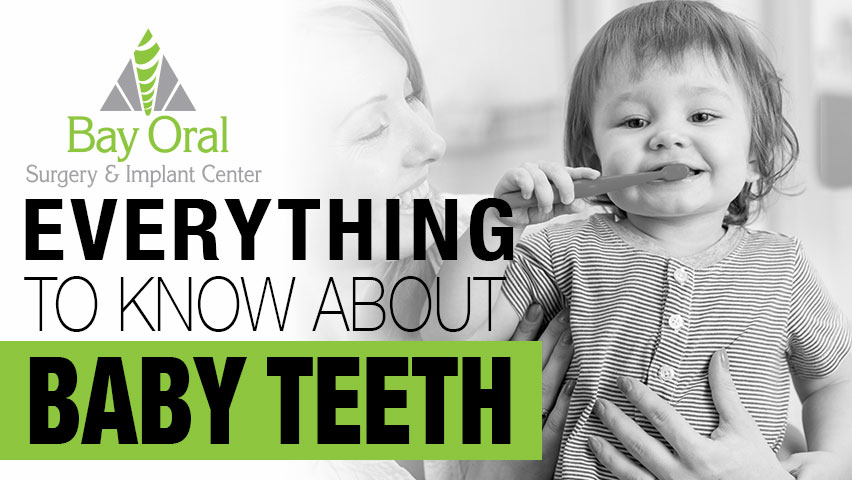
by Bay Oral Surgery | Feb 6, 2020 | Blog

If you have a baby or toddler, it’s important to know what to expect when it comes to their primary (or baby) teeth. Here is a simple guide with everything you need to know about baby teeth.
How many baby teeth are there?
There are typically 20 baby teeth—10 on top and 10 on bottom. However, it is possible for some children to be missing some of their baby and/or adult teeth.
When will baby teeth start coming in?
Baby teeth typically begin to erupt between 6 months to 1 year, and most children will have their full set of baby teeth by the time they are 3 years old.
Is there a certain order in which they appear?
Yes, there is a typical order for teeth to appear, but every child is different so it’s possible that some may not follow this exact order. Typically the front two bottom teeth (central incisors) are the first to appear with the front two top teeth to follow. Here is a great visual from the ADA as well as a link to a very helpful baby teeth eruption chart (click here):
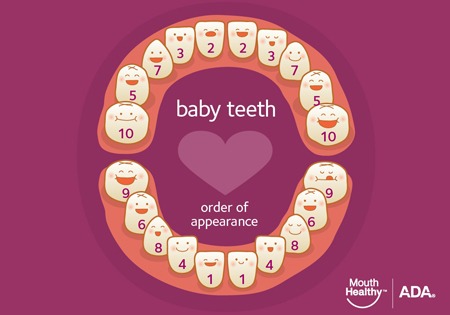
What can help with teething?
It’s not surprising that it is painful for teeth to cut through the gums, so this can cause sore and tender gums in babies. Teething can sometimes also be accompanied by drooling and low-grade fevers. Some ways you can help soothe the pain is by rubbing your child’s gums with a clean finger or a small, cool spoon or giving them a teething ring or toy that has been frozen or refrigerated to chew on. If your child is still cranky, a dose of infant’s or children’s pain reliever may help, but you should consult with your dentist or doctor for the best course of action and for the correct dosage amount based on your child’s age and weight.
When and how to care for baby teeth?
You should start caring for your child’s gums/teeth from the very start. Even before they have teeth, you should clean your baby’s mouth by wiping the gums with a clean, moist washcloth.
As soon as teeth appear you should begin brushing their teeth with a children’s toothbrush using fluoride toothpaste with an amount about the size of a grain of rice. Brush twice a day to establish good habits when they are young. When they start brushing on their own, you should supervise to ensure they are using the correct amount of toothpaste. It is important that they do not use too much and that they do not swallow it.
For children ages 3 to 6, they should use a pea-sized amount of fluoride toothpaste, also brushing twice a day.
Once your child has two teeth that touch you can also begin flossing between their teeth daily.
When to go to the dentist for the first time?
You should take your child to the dentist by age one or within six months of when the first tooth erupts. At the first visit the dentist can check for cavities, examine their teeth/gums and show you how to care for their teeth properly. You may want to consider seeing a pediatric dentist as they specialize in kids and typically make the overall experience more enjoyable for children.
What happens if baby teeth get a cavity?
Even though baby teeth are temporary, it’s still very important to care for them and have cavities treated to ensure they last as long as possible. Untreated cavities can also cause toothaches or infections. Baby teeth are important for a long-term healthy smile. They create a path for permanent teeth to follow and damaged teeth can result in problems with jaw structure and growth. Baby teeth help with chewing, speech development and maintaining proper position of all teeth, so it’s very important to take good care of them and have them treated if there is a problem.
When do the baby teeth start falling out?
Again, every child is different, but the first baby tooth typically falls out around age 6 or 7. And the first to go is typically the first that came in—the bottom two front teeth (central incisors). Baby teeth continue falling out until about age 10 or 12.
When are baby teeth done falling out?
Most kids have 28 permanent, adult teeth by the time they are 12 or 13 years old. There are 32 permanent teeth in all, including the four wisdom teeth. For those who have wisdom teeth, these typically appear anywhere between age 17 and 25.
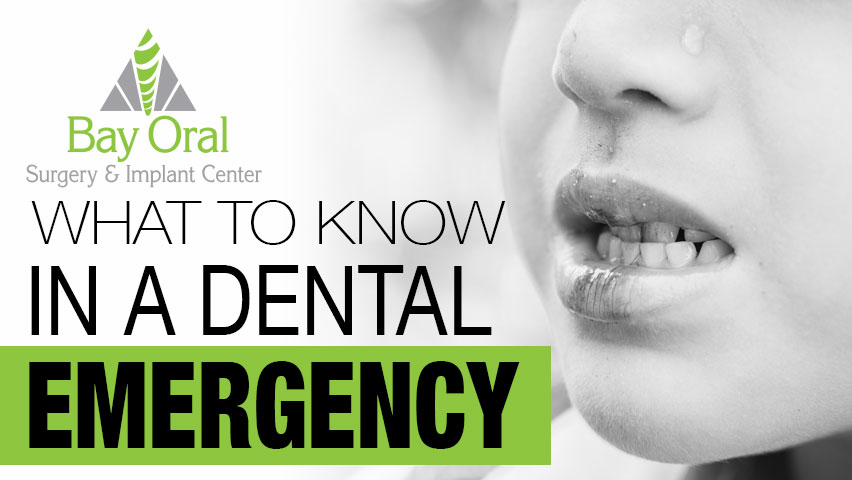
by Bay Oral Surgery | Jan 14, 2020 | Blog

It’s good to know in advance where to go and what to do in the event of dental emergencies, so you are prepared.
There can be a variety of types of dental emergencies and some are more urgent than others. Some of the most common dental emergencies include knocked out teeth, a cracked tooth, toothaches, displaced filling or crown, bitten tongue or lip, something stuck in the mouth and facial trauma or injuries. Here are some tips to keep in mind if you experience any of these issues.
Where to go
In all dental emergencies it is best to see your dentist or an oral surgeon as soon as possible. Most dentists and oral surgeons have someone on-call for emergencies, so keep their emergency number on-hand or call their office and it will likely provide you with a number to call in case of an after-hours emergency. Seeing your dentist will provide you with a more immediate solution–saving you time and money over a visit to the emergency room.
(If you are on vacation or out of town, it is still best to contact a local dentist for your dental emergency. A quick Google search should help you find one.)
What to do
Here are a few tips on what to do in the most common dental emergencies until you can get to a dentist or oral surgeon:
- For a knocked-out permanent or adult tooth, if possible, try placing the tooth back in the socket without touching the root until you can get to the dentist. If that is not possible, place the tooth in between your cheek and gums or put it in salt water or milk until you can get to the dentist/oral surgeon. Never attempt to wipe the tooth off because the attached remnants of the ligament holding the tooth in the jaw are vital to the successful replanting of the tooth. Time is of the essence with this situation, so the sooner the tooth is re-inserted into the dental socket, the better chance it will survive.
- For a cracked tooth, immediately rinse the mouth with warm water to clean the area. Put a cold compress on the face as needed to keep any swelling down.
- For a toothache, rinse the mouth with warm water to clean it out. Gently floss to remove any food caught between the teeth that may be causing the pain. Take a pain reliever to help with the pain until you can see a professional.
- If a filling or crown breaks or falls off you can likely wait a few days to have it fixed or replaced, but call your dentist to let them know the situation and decide.
- For a bitten tongue or lip, clean the area gently with water and apply a cold compress. If the bite is severe, stitches may be necessary and you will want to get to the dentist right away.
- If an object is stuck in your or your child’s teeth, you can try to gently remove it with floss, but do not try to remove it with sharp or pointed instruments.
- For facial trauma or injury it may be necessary to go to the Emergency Room depending on the severity and if there are any other bodily injuries. You may consider calling your dentist or oral and maxillofacial surgeon to meet you there.
The oral and maxillofacial surgeons at Bay Oral Surgery & Implant Center in Green Bay, Marinette and Niagara, Wisconsin are uniquely qualified to manage and treat various forms of facial trauma and injuries. They are on staff at local hospitals and provide emergency room coverage for facial injuries, which include facial lacerations, intra oral lacerations, knocked out teeth, fractured facial bones (cheek, nose and eye socket), and fractured jaws (upper and lower).

by Bay Oral Surgery | Dec 12, 2019 | Blog

The human face is a complex system of bone, muscle, fat, and skin tissues. The intricate relationship between the skin and the underlying muscle and fat tissue plays an essential role in the formation of wrinkles, lines and skin laxity. Botox and fillers are used to compensate some of the changes that happen to the face over time. However, Botox can also be used for the management of migraine headaches and other medical conditions. Botox is a neurotoxin that causes temporary paralysis of the muscle in which it is injected. This paralysis relaxes the muscle and usually helps eliminate some of the overlying skin wrinkles and lines. In certain situations, Botox can also be used to improve the look of your smile. One of the very rewarding uses of Botox is to manage a high smile line, or a “Gummy Smile”, as shown in the pictures below.
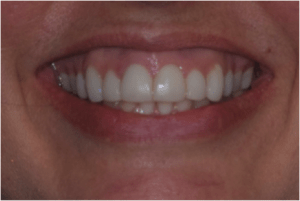
BEFORE
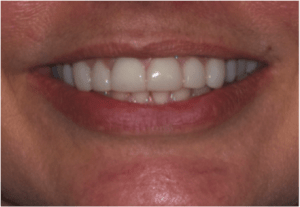
AFTER
In the example above, the patients’ lip was elevating too high, exposing the gingival tissue when smiling, something this patient wanted to fix. The use of Botox in this kind of situation will provide a resolution for approximately 3-6 months.
One of the most common uses of Botox is for the frown lines formed between the eyebrows. Targeting the underlying muscles with Botox will provide temporary resolution.

BEFORE
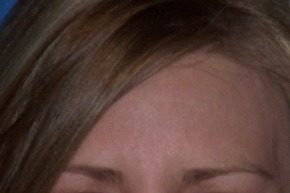
AFTER
In addition to facial aesthetic application, Botox has also been used extensively by multiple healthcare providers for headache relief and other medical conditions.
Fillers are mainly used to replace lost volume. As we age, a significant amount of fat in the facial structure will atrophy, causing unwanted wrinkles, folds, and lines. Just like Botox, fillers’ effects are temporary and can range from 3 months to 1 year depending on the kind of filler used and where it is applied. Most fillers are applied in the lips and areas around the mouth.
Both Botox and fillers may have risks and complications such as unwanted paralysis, need for multiple applications, allergic reactions, bruising, and others. Luckily, complications are rare and can typically be managed successfully.
Patients who desire to have minimally invasive cosmetic procedures like Botox or fillers would require a consultation to be evaluated and discuss their specific needs and wants with the provider. If they were determined to be candidates for the procedure, a customized treatment plan would be created to address their unique needs.
People typically think of dermatologists, medical spas or aesthetician offices for Botox or fillers, but this is a service that Bay Oral Surgery & Implant Center is going to be adding to its list of services in 2020. Stay tuned for an official announcement with more details coming soon!
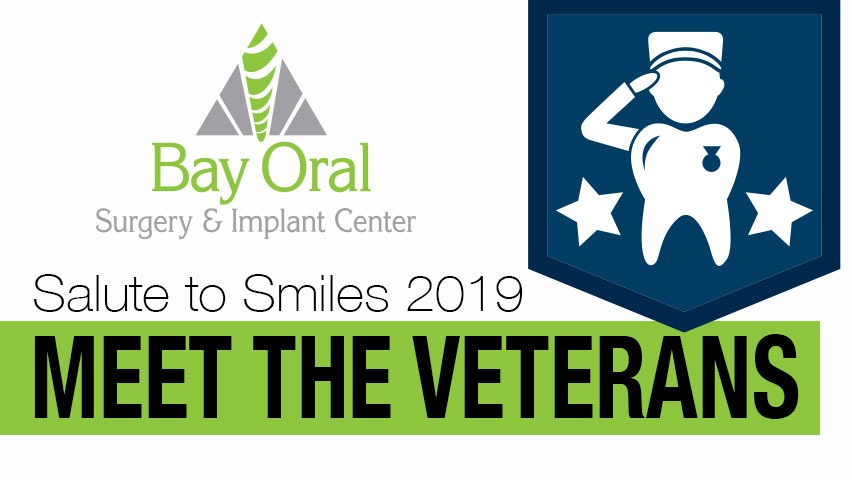
by Bay Oral Surgery | Nov 11, 2019 | Blog
 Now in its fourth year of serving local veterans with Salute to Smiles, Bay Oral Surgery & Implant Center, in partnership with other local dentists, is helping eight local veterans with their dental issues to get their smiles back in 2019. Together, they will cover all expenses for the veterans who otherwise could not afford these much-needed procedures. Dental procedures range from implants and bridges to extractions, crowns and dentures.
Now in its fourth year of serving local veterans with Salute to Smiles, Bay Oral Surgery & Implant Center, in partnership with other local dentists, is helping eight local veterans with their dental issues to get their smiles back in 2019. Together, they will cover all expenses for the veterans who otherwise could not afford these much-needed procedures. Dental procedures range from implants and bridges to extractions, crowns and dentures.
Salute to Smiles began in 2015 and was inspired by Bay Oral Surgery’s former military oral surgeons who saw this as a way to give back to area veterans. Bay Oral Surgery & Implant Center also partners with local dentists and dental supply businesses to provide all of the needed services to the patients free of charge. Twenty-seven local veterans have benefited from this great program since 2015.
Meet the 2019 Veterans!
Donald (Don) Sitte

Don, of Sister Bay, Wisconsin is a veteran of the US Navy. Don served in the US Navy from 1944 until 1966 when he was honorably discharged at the rank of YN3 and then transferred to the Naval Reserves until 1969. Don is having his dental work done by Dr. Graf and Dr. Ellis.
Randall (Randy) Barth

Randy, of Green Bay, Wisconsin is a veteran of the US Marine Corp. Randy served in the US Marine Corp from 1967-1969. He was wounded in Vietnam in 1968. In 2019, Randy was selected to take the Old Glory Honor Flight to Vietnam. Randy is having his dental work done by Dr. Brian Koch and Dr. Bradley Koch.
Claude Haevers

Claude, of De Pere, Wisconsin is a veteran of the US Marine Corp. Claude joined the US Marines in 1963 and served in Vietnam from 1965 to 1966. Claude is having his dental work done by Dr. Matthew Wagner.
William (Bill) Parenteau

Bill, of Superior, Wisconsin is a veteran of the US Army. Bill enlisted in the US Army as a Vulcan Air Defender and served just over 10 years. Bill is having his dental work done by Dr. Brodhagen & Dr. Ellis.
Loyll Plinske
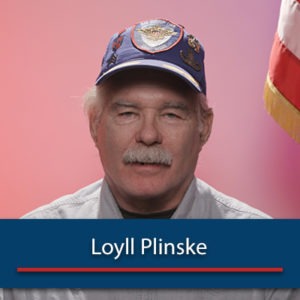
Loyll, of Green Bay, Wisconsin is a veteran of the US Army. He was a sergeant and served part of his time in the 5th infantry division in Fort Bliss, Texas. Loyll is having his dental work done by Dr. Villwock.
William (Bill) Mathis

Bill, of Ashwaubenon, Wisconsin is a veteran of the US Air Force. Bill served in the US Air Force for 4 years in various locations stateside and in Vietnam. Bill is having his dental work done by Dr. Maraka and Dr. Parmar.
Steve Stillman

Steve, of Green Bay, Wisconsin is a veteran of the US Army and served over 13 years for his country. Steve is having his dental work done by Dr. Ulve & Dr. Parmar.
Jayson Haneiwich
Jayson is a veteran of the US Army. Jayson served in the US Army for 6 years doing a tour in South Korea with deployments to both Iraq and Afghanistan. He served as a 63B all-wheel mechanic and was on the recovery team during deployments. Jayson is having his dental work done by Dr. Hallas and Dr. LeMoine.
You can check out the videos of the 2019 Salute to Smiles veterans by visiting: www.bayoralsurgery.com/salute-to-smiles
Thank you!
At Bay Oral Surgery & Implant Center, we are grateful to our veterans and glad we found a small way to give back to them! We also want to recognize and thank everyone who helped make this program a reality—the oral surgeons and dentists who donated their time and services and the sponsors who donated products and supplies.
Bay Oral Surgery Team
Dr. Charles Ellis, DDS, MD (US Navy Veteran)
Dr. Bradley Koch, DDS (US Navy Veteran)
Dr. Vijay Parmar, DDS
Dr. Jason LeMoine, DDS
Dentist & Dental Office Partners
Dr. Brian Koch, DDS (US Air Force Veteran), Oral Health Associates
Dr. Matthew Hallas, DMD, Bay Lakes Center for Complex Dentistry, SC
Dr. Mark Brodhagen, DDS, SC, Brodhagen Dental Care
Dr. Matthew Wagner (Army National Guard), DDS, Robert H. Wagner Family Dentistry
Dr. Eric Ulve, DDS (US Navy Veteran), Green Bay Family Dental
Dr. Bob Villwock, DDS, Bellevue Family Dentistry
Dr. Patrick Maraka, DDS, Dental Arts Associates of Green Bay LTD
Dr. Zach Graf, DDS (US Marines Veteran), Dental Arts Associates of Green Bay LTD
Sponsors
New Creations Dental Laboratory
Straumann
Nobel Biocare
Dentsply Implants
Lord’s Dental Studio
Dental Health Products, Inc (DHPI)
Cosmetic Arts Dental Lab
McKesson
QC Quality Crown & Bridge Studio, Inc.
































